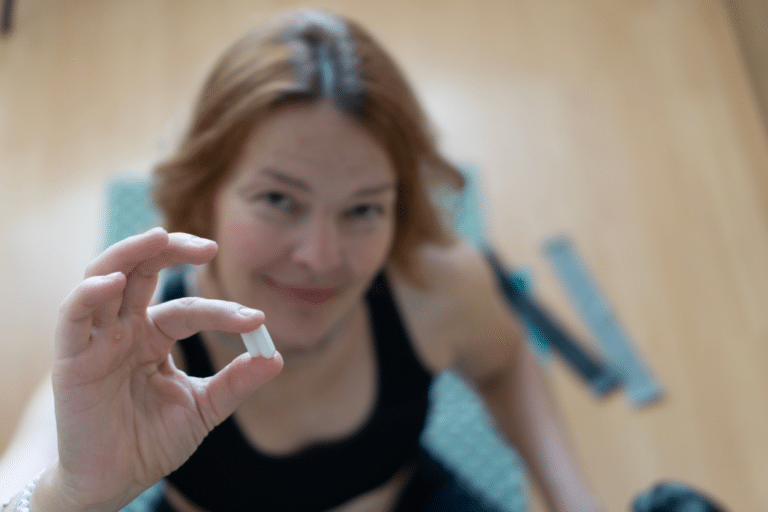We all know that our bones are the foundation of our bodies, but they often get overlooked. It’s easy to forget about them until we start feeling aches and pains or maybe even notice a fracture when we least expect it. While getting enough calcium (preferably from food) and vitamin D is super important for bone health, it’s also essential to pay attention to the medications and supplements we’re using. Some of them, while necessary for other reasons, can mess with our bones in ways we don’t always notice right away. So, let’s dive in!
Medications That Can Affect Bone Health
1. Corticosteroids (like prednisone)
If you’ve ever had to take corticosteroids for things like asthma, poison ivy, or arthritis, you probably already know they come with side effects. What you might not realize is that long-term use can decrease bone formation and speed up bone breakdown. This increases your risk of developing osteoporosis (aka thinning bones). If you’re on corticosteroids, chat with your doctor about using the lowest possible dose, and consider adding bone-strengthening measures like calcium, vitamin D, and regular exercise to the mix. Your bones will thank you!
2. Anticonvulsants (like phenytoin and phenobarbital)
Medications for epilepsy or seizures, such as phenytoin and phenobarbital, can interfere with how your body processes vitamin D, which is crucial for calcium absorption. This can lead to bone loss over time. If you’re on these meds, you’ll want to be diligent about getting enough calcium and vitamin D in your diet or through supplements. And just to be extra safe, make sure to talk to your doctor about getting your bone health checked regularly via DEXA scan.
3. Proton Pump Inhibitors (PPIs) (like omeprazole)
For those of us dealing with acid reflux or GERD, PPIs like omeprazole are often a go-to. But here’s the catch: these meds reduce stomach acid, and since stomach acid helps you absorb nutrients, taking PPIs long-term can increase your risk for bone thinning.
The fix? Talk to your doctor about whether you really need them for the long haul, or if there are alternative treatments that don’t come with this risk (like Pepcid). If you do need them, make sure you’re getting enough calcium, and consider calcium citrate, which is easier to absorb when stomach acid is low.
4. Thiazolidinediones (like pioglitazone)
These medications, often prescribed for diabetes, have been linked to a decrease in bone mineral density. In other words, they can weaken your bones over time, especially if you’re using them long-term. If you’re on thiazolidinediones, make sure to talk to your doctor about whether there are other diabetes medications that might be easier on your bones. You’ll also want to keep an eye on your bone density with regular screenings.
5. SSRIs (Selective Serotonin Reuptake Inhibitors) (like fluoxetine, sertraline, paroxetine)
Here’s a big one for midlife women. SSRIs, often prescribed for depression or anxiety, might not only affect your mood, but they can also impact your bone health. A recent study showed that long-term use of SSRIs can increase the risk of fractures due to their effects on bone formation.
If you’re on an SSRI, don’t panic, but it’s definitely a good idea to check in with your doctor about getting your bone health monitored. You might need to take extra care with calcium and vitamin D, or possibly explore alternatives for managing your mental health if it’s a long-term concern.
6. Chemotherapy Drugs
Chemotherapy can be a life-saving treatment, but unfortunately, it can also weaken your bones. Many chemotherapy drugs can interfere with the normal bone remodeling process, making bones more fragile. If you’re undergoing chemotherapy, it’s a good idea to talk with your oncologist about what you can do to protect your bones, including bone-strengthening supplements, weight-bearing exercises, and possibly medications to help prevent bone loss (although these have their own set of issues).
7. Estrogen Blockers (like tamoxifen, anastrazole)
Estrogen blockers are commonly used in the treatment of breast cancer to prevent the hormone estrogen from fueling the growth of cancer cells. However, while they’re great for managing breast cancer, they can also reduce bone density over time (due to that estrogen blockade), making your bones more vulnerable.
If you’re taking an estrogen blocker, be sure to discuss bone health strategies with your doctor, including bone density testing, calcium and vitamin D supplementation, and possibly bisphosphonates or other bone-strengthening treatments.

Want relief from the symptoms of perimenopause?
You’re in the right place.
You don’t have to suffer. I can help you balance your hormones and get your mojo back!
Supplements That Can Impact Bone Health
It’s not just medications that can affect our bones. Some of the supplements we take, thinking we’re helping ourselves, might actually be doing more harm than good. Let’s go over a couple that could be problematic:
1. Excessive Vitamin A
We know vitamin A is important for immune function and skin health, but too much of it can be harmful to your bones. In fact, high doses of vitamin A, especially in supplement form, can lead to bone loss and increase the risk of fractures. Stick to the recommended daily intake and avoid mega-doses, especially if you’re taking vitamin A supplements for other reasons.
2. Unbalanced Calcium
You’ve heard it a million times; calcium is crucial for bone health. But here’s the kicker: too much calcium, especially without enough magnesium, can cause problems. Your body needs both of these minerals in balance, and when you overload on calcium without magnesium, it can mess with your bones. If you’re supplementing with calcium, make sure you’re getting a balanced formula that includes magnesium. Or get your calcium from food. Dairy products and leafy greens are good sources.
3. Unregulated Herbal Supplements
Some herbal supplements might sound great, but they can interact with medications in ways that harm your bones. For example, supplements like licorice and alfalfa can interfere with calcium absorption or act as diuretics, causing you to lose calcium. Always talk to your doctor or pharmacist before adding new herbal supplements, especially if you’re taking prescription medications.
4. High-Dose Vitamin E
Vitamin E is another one of those supplements you might take for its antioxidant benefits. But high doses of vitamin E, especially in supplement form, have been linked to a higher risk of bone fractures. The key is to stick to the recommended daily intake and avoid taking mega-doses of vitamin E without checking with your doctor first.
What You Can Do About It
So, what can you do to protect your bones, even if you’re on one of these medications or supplements? Here are a few simple strategies:
- Corticosteroid Users: Talk to your doctor about reducing the dose if possible. Make sure to get plenty of calcium, vitamin D, and weight-bearing exercise to help keep your bones strong.
- Anticonvulsant Users: Stay on top of your calcium and vitamin D intake, and consider getting regular bone density screenings to keep an eye on your bone health.
- PPI Users: Use these medications at the lowest effective dose and for the shortest time possible. Consider calcium citrate, and make sure to include foods high in calcium and vitamin D in your diet.
- Thiazolidinedione Users: Get regular bone density tests and talk to your doctor about alternative diabetes treatments if bone health is a concern.
- SSRIs: Be proactive about bone health by taking calcium and vitamin D, and work with your doctor to monitor your bone density over time.
- Chemotherapy Patients: Work with your oncologist to incorporate bone-healthy strategies, such as weight-bearing exercises and bone-strengthening supplements.
- Estrogen Blocker Users: Be proactive about protecting your bones with calcium, vitamin D, and regular bone density screenings. Your doctor might also suggest treatments to help mitigate the bone loss caused by these medications.
Lifestyle Changes to Keep Your Bones Strong
While medications and supplements are a big part of the picture, don’t forget that your daily habits matter too! Here’s what you can do:
- Eat for Your Bones: Load up on calcium-rich foods (think leafy greens, dairy, fortified plant-based milks), vitamin D (fatty fish, eggs, fortified foods), and magnesium (nuts, seeds, whole grains).
- Exercise: Weight-bearing activities like walking, dancing, or strength training are fantastic for keeping your bones strong. Aim for at least 30 minutes of moderate activity most days of the week.
- Limit Alcohol and Quit Smoking: Both of these habits can negatively affect your bone health, so cutting back on alcohol and quitting smoking can give your bones a fighting chance.
- Get Your Bone Density Checked: If you’re on medications that affect your bones, talk to your doctor about regular bone density screenings. The earlier you catch bone loss, the easier it is to manage. Current guidelines suggest waiting until 65 to get screened, but the osteoporosis horse is out of the barn by then. Insist on a referral for the test or pay out of pocket. It’s that important!
Conclusion
We all want strong, healthy bones, but sometimes the medications and supplements we take can cause sneaky problems over time. The good news? By staying informed, working closely with your healthcare provider, and making a few proactive changes, you can keep your bones strong and YOU out of the nursing home in the future. If you’re concerned about any of the medications or supplements you’re using, don’t hesitate to have a conversation with your doctor or pharmacist. Your bones will thank you!
References
- Gennari, L., et al. (2023). “Bone Loss Associated with Antidepressant Use.” Osteoporosis International, 34(4), 849-858.
- Davis, R., & Lee, M. (2022). “Impact of Corticosteroids on Bone Health: A Review of Clinical Findings.” Endocrine Reviews, 43(2), 324-335.
- Taylor, S., & Green, P. (2024). “Proton Pump Inhibitors and Bone Mineral Density: A Meta-Analysis.” Osteoporosis International, 35(3), 567-574.
- Lee, J., et al. (2021). “Use of Selective Serotonin Reuptake Inhibitors and Risk of Subsequent Bone Loss in a Nationwide Population-Based Cohort Study.” Scientific Reports, 11, 12345.
- Smith, J., & Clark, R. (2024). “Estrogen Blockers and Bone Health: What You Need to Know.” Journal of Clinical Oncology, 42(8), 1239-1247.
- Johnson, K., et al. (2023). “The Effects of High-Dose Vitamin E on Bone Mineral Density: A Review.” Journal of Bone and Mineral Research, 38(5), 1342-1351
Dr. Anna Garrett is a menopause expert and Doctor of Pharmacy. She helps women who are struggling with symptoms of perimenopause and menopause find natural hormone balancing solutions so they can rock their mojo through midlife and beyond. Dr. Anna is the author of Perimenopause: The Savvy Sister’s Guide to Hormone Harmony. Order your copy at www.perimenopausebook.com.
Dr. Anna is available for 1-1 consultation. Find out more at www.drannagarrett.com/lets-talk




